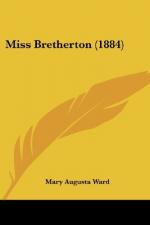Shortly after her marriage the father and mother died, within eighteen months of each other, and Eustace found his lot in life radically changed. He had been his father’s secretary after leaving college, which prevented his making any serious efforts to succeed at the bar, and in consequence his interest, both of head and heart, had been more concentrated than is often the case with a young man within the walls of his home. He had admired his father sincerely, and the worth of his mother’s loquacious and sometimes meddlesome tenderness he never realised fully till he had lost it. When he was finally alone, it became necessary for him to choose a line in life. His sister and he divided his father’s money between them, and Eustace found himself with a fortune such as in the eyes of most of his friends constituted a leading of Providence towards two things—marriage and a seat in Parliament. However, fortunately, his sister, the only person to whom he applied for advice, was in no hurry to press a decision in either case upon him. She saw that without the stimulus of the father’s presence, Eustace’s interest in politics was less real than his interest in letters, nor did the times seem to her propitious to that philosophic conservatism which might be said to represent the family type of mind. So she stirred him up to return to some of the projects of his college days when he and she were first bitten with a passion for that great, that fascinating French literature which absorbs, generation after generation, the interests of two-thirds of those who are sensitive to the things of letters. She suggested a book to him which took his fancy, and in planning it something of the old zest of life returned to him. Moreover, it was a book which required him to spend a part of every year in Paris, and the neighbourhood of his sister was now more delightful to him than ever.
So, after a time, he settled down contentedly in his London chambers with his books about him, and presently found that glow of labour stealing over him which is at once the stimulus and the reward of every true son of knowledge. His book reconciled him to life again, and soon he was as often seen in the common haunts of London society as before. He dined out, he went to the theatre, he frequented his club like other men, and every year he spent three of the winter months in Paris, living in the best French world, talking as he never talked in London, and cultivating, whether in the theatre or in the salons of his sister’s friends or in the studios of some of the more eminent of French artists, a fastidious critical temper, which was rapidly becoming more and more exacting, more and more master of the man.




